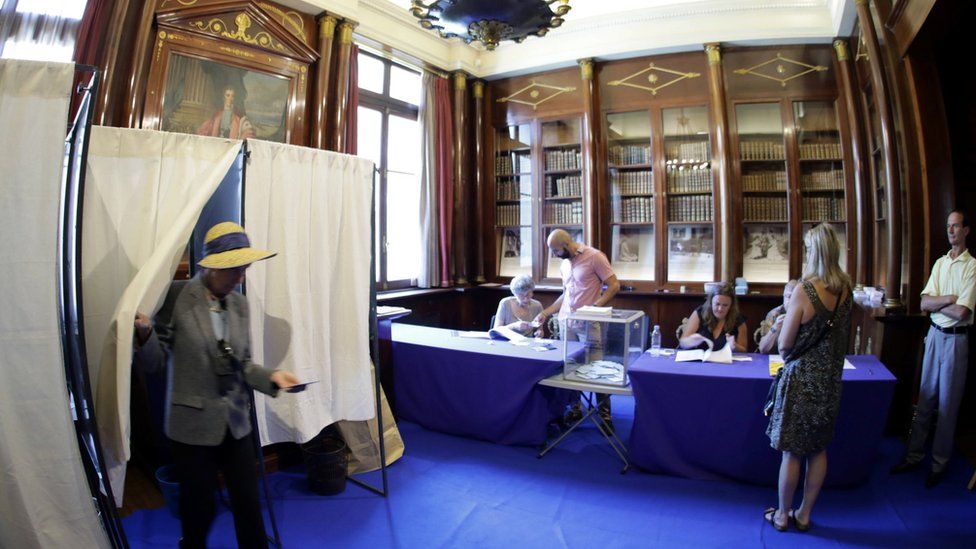France returns to polls to elect new parliament
- Published

French voters are casting their ballots to pick their new MPs, a month after electing political outsider Emmanuel Macron as president.
Mr Macron will be hoping the candidates for his centrist party, La Republique en Marche (Republic on the Move), will pick up the majority of the 577 seats.
The election is held in two rounds, with the second next Sunday.
Victory for Mr Macron's party would be a watershed moment, pushing the two established parties to the sidelines.
Both the centre-right Republicans and the Socialists failed to reach the presidential run-off last month, for the first time in France's post-war history.
Polls opened at 06:00 GMT and close at 18:00, with the first projections expected shortly afterwards.
However, few MPs are expected to be elected in this first round of voting.
Only candidates who win more than 50% of the vote will do so, otherwise all candidates who secure at least 12.5% of registered voters will go into the second round, where the winner takes the seat.
Mr Macron's party, which was only established a little over a year ago, has fielded a selection of candidates from all walks of life - including students, the retired and a bullfighter.
LREM candidates have already won 10 out of the 11 seats voted for by French overseas constituencies, and opinion polls suggest they could make the same impact in the mainland.
The new president has already left an impression around the world, in particular for standing up to US leader Donald Trump on issues like climate change.
But the 39-year-old needs to gain a majority to push through the changes he has promised to reform France.
Meanwhile, parties like Marine Le Pen's far-right National Front (FN) and Jean-Luc Mélenchon's far-left France Unbowed are hoping to capitalise on voters turning their back on the mainstream Republicans and Socialists.
However, the winner-takes-all-system tends to favour the big parties, analysts say.
A number of the constituency races will be worth watching:
- Will Manuel Valls, the unpopular Socialist ex-prime minister rejected as a candidate by both LREM and the Socialists, be ousted from his Essonne seat by Dieudonné MBala MBala, a notorious comic convicted of hate speech, or singer Francis Lalanne - in a 20-candidate contest described by some as a "circus"?
- Will it be third time lucky for Marine Le Pen in the Pas-de-Calais department of northern France - or will she fall to LREM novice Anne Roquet?
- Will LREM junior minister Mounir Mahjoubi, 33, oust Socialist Party leader Jean-Christophe Cambadélis, 65, from a seat in Paris that he has held for 20 years?
- Will Jean-Luc Mélenchon win his battle in Marseille against sitting Socialist Patrick Menucci and LREM first-timer, Corinne Versini?
The election is taking place amid heightened security after a series of devastating terror attacks in recent years.
Some 50,000 police officers are on patrol on Sunday.
Turnout by 15:00 GMT had reached 40.75%, the interior ministry said, compared to 48.31% at the same time five years ago.
- Published19 June 2017
- Published6 June 2017
- Published3 June 2017
- Published10 May 2017